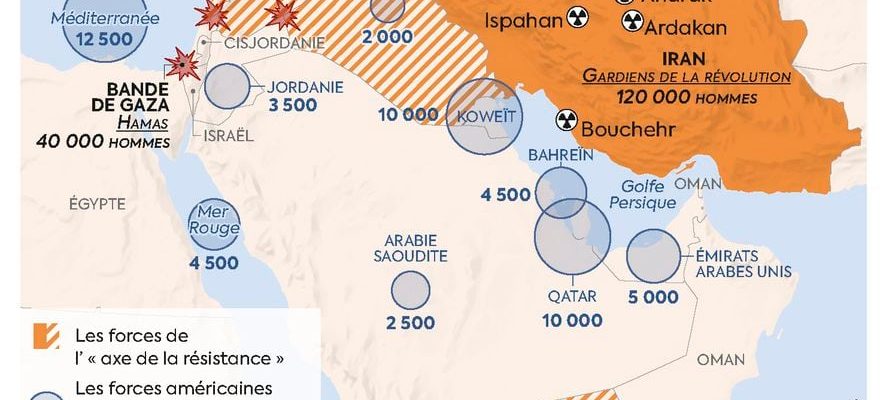Thousands of soldiers deployed, American and Israeli, facing a threat present on multiple terrains. Particularly intense fighting in northern Israel, on the border with Lebanon. At the same time, the enemy state, some 2000 kilometers away, hit by aerial bombardments. Is this scenario, that of Operation “Chariots of Fire”, the largest military exercises ever carried out jointly by the United States and Israel, in spring 2022, becoming more and more plausible? On Monday, April 1, unclaimed strikes targeted an annex of the Iranian embassy in Damascus, killing in particular General Mohammad Reza Zahedi, one of the key members of the Al-Quds force, the elite force of the Guardians of the Iranian revolution.
In Israel, there is little doubt about the involvement of Tehran, support of Hamas and Hezbollah, in the events of October 7, and it does not matter if its extent remains difficult to determine. For the Israelis, the equation boils down to this: how to hit Iran without hitting Iran? How can we target all those who are responsible in one way or another for this Israeli “September 11,” including beyond the borders of Gaza? The best way to hit the Tehran regime is to strike in Syria, where Bashar al-Assad’s regime has depended for many years on the support of its ally, and where Shiite militias thrive. This is where hundreds of Israeli strikes have taken place since October 7, both against these armed groups and against the Revolutionary Guards (at the beginning of January, Iranian general Razi Mousavi was killed in Damascus) . In response to Iran, which has expanded the conflict beyond Palestine through the network of its proxies – Houthis, Hezbollah, etc. -, Israel is also playing the role of regionalization of the war.
© / Cartography legends
A few months before the American presidential election, the Israelis also need to force the Americans to stay there, whatever the developments. “You have to know who your friends are and who your enemies are. Israel is our friend. Iran is our enemy,” declared former American army general David Petraeus a few weeks ago, speaking to the think tank Council of Foreign Relations, assuring that “the United States was always reminded by the Middle East”, whatever their desire to leave it. Iran and Hezbollah have already vowed that the Damascus attack will not go unpunished. For Abbas Milani, a researcher at Stanford University, “neither side can afford direct confrontation. But each side must show that it is doing something.” The Iranians and their militia based in Lebanon have been keen to remain on a ridge line since October 7, avoiding any movement that would lead to an escalation that would be too uncontrollable.
But it seems unlikely that the Iranians will remain unresponsive to this unprecedented attack, and against a diplomatic building to boot. Aytollah Ali Khamenei warned this Tuesday that “the evil Zionist regime will be punished by our brave men.” The Iranians could choose to target Israeli interests abroad, such as embassies – Iran did not hesitate in 1992 to attack the Israeli embassy in Buenos Aires. The Iranians also have the capacity to carry out targeted assassinations abroad, but usually target their opponents instead. The easiest Iranian “weapon” to activate remains Hezbollah. Exchanges of fire are almost daily on the border with Lebanon and Israel had to evacuate 80,000 of its nationals last November. Will the scale of the April 1 attack galvanize the Iranians and push them to take the threat up a notch? The arbiter will undoubtedly be Washington, and the fear of reprisals that the Americans inspire in the leaders of Tehran. The role of Russia also raises questions. It is difficult to imagine that Israel could carry out all these attacks without the tacit approval of Vladimir Putin, a strategic ally of Damascus and Tehran, but who is also keen not to liquidate thirty years of Israeli-Russian rapprochement, in a period more volatile than ever. While hopes of a truce in Gaza are not moving forward, the “shadow” war which has lasted for years between Tel Aviv and Tehran is increasingly taking center stage.
.
